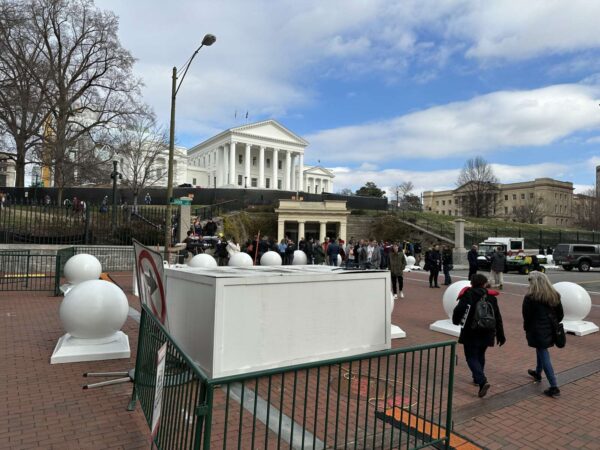
(Updated at 4 p.m.) There seems to be bipartisan agreement among state lawmakers about at least one issue: something must be done about the popping and roaring of noisy mufflers.
On Saturday (Feb. 25), the Virginia General Assembly adjourned its 2023 winter legislative session, which some say has been too short to get vital work done. These bills will now head to Gov. Glenn Youngkin to review before March 27.
With Republicans controlling the House of Delegates and Democrats the Senate, Arlington’s all-Democratic representation introduced a laundry list of bills that failed. These ranged from one permitting same-sex marriage to increasing gun control and leveling the playing field for online news outlets like ARLnow.
Those seeking relief from cars with loud exhausts fell short of a total victory, but both the Virginia House of Delegates and the State Senate passed a version of Sen. Adam Ebbin’s bill, SB 1085, that would study the issue.
His original bill would have prohibited the sale and use of aftermarket mufflers. Now, the legislature is directing the Department of Transportation to “convene a workgroup of specified stakeholders to examine the issue of vehicle noise in the Commonwealth and to report its findings and recommendations” to the chairs of each chamber’s transportation committee by Nov. 1.
His bill follows up on last year’s reversal of a 2021 law that prevented police from pulling over drivers just for having an excessively loud exhaust system. The original law was intended to reduce pretextual traffic stops and racial disparities but might have contributed to an uptick in noise complaints.
Of all the bills filed by local legislators that ARLnow highlighted at the start of the 2023 legislative session, this was the only one to pass.
However, a slew of bills from other lawmakers did make it through, including a few notable ones listed below.
Crime
- HB 1583 (Del. “Rip” Sullivan) makes it illegal to use drones to spy on someone, regardless of where that device is located.
- HB 1590 (Sullivan) modernizes a harassing phone call statute that used to apply only to telephones and pagers. Now, it would be a misdemeanor to annoy or delay emergency personnel trying to do their job by causing any device to ring or signal an alert repeatedly.
- SB 887 (Sen. Barbara Favola) requires out-of-cell programs and congregant activities for four hours a day for people in solitary confinement at the state prison, unless there is a lockdown. People in solitary confinement must receive physical and mental health evaluations and there has to be a publicly available process for restoring people to the general prison population.
Consumer protection
- HB 1857 (Del. Elizabeth Bennett-Parker) is intended to prevent resellers from misleading ticket buyers by prohibiting them from making their website look similar to a ticket operator’s website. It also prohibits the display of trademarked or copyrighted information from an operator or a primary ticket provider without their consent.
- SB 871 (Favola) would make it illegal for car manufacturers, factories and distributors to threaten to take away incentives from buyers or the right to participate in incentive programs.
Controlled substances
- HB 2296 (Del. Patrick Hope) directs the state Secretary of Finance to determine a way to license manufacturers, distributors and sellers of liquid nicotine and ensure that product gets sold to of-age buyers only.
Employment
- HB 1924 (Hope) requires employers to pay people with disabilities the minimum wage.
- HB 1730 (Bennett-Parker) allows the Virginia Alcoholic Beverage Control to hire certain people who previously committed a felony.
Tax credits
- HB 2387 (Del. Alfonso Lopez) establishes an income tax credit of up to $300 for people who purchase a firearm safety device, which Lopez tells ARLnow had the support of the National Rifle Association and major gun violence prevention groups.
- HB 2445 (Bennett-Parker) renews a tax credit awarding farmers up to $10,000 for donations to nonprofit food banks.
Other civil laws
- HB 2071 (Lopez) would make it easier to approve non-ministers to oversee marriages by allowing any clerk — not just a circuit court judge — to authorize someone to celebrate marriage rites, and allowing waivers of the $500 fee for people who can’t pay.

